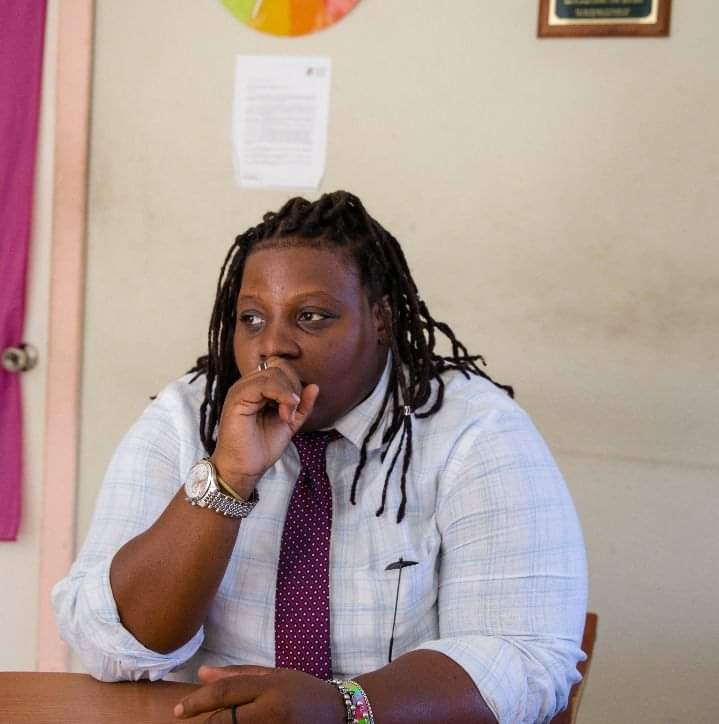Trans activist endures gang hell in Port-au-Prince, Haiti
Moïse Manoël-Florisse, is an African-Caribbean online journalist keeping an eye…
‘I’ve lost faith in the future of my own country’, says transgender Haitian

Trans activist Dominique Rebel Saint-Vil of OTRAH (Organisation Trans d’Haïti) is surviving — barely — in his beleaguered, impoverished gang-controlled nation.
In the following interview, he describes his exile in his own country, prey to armed gang violence that reigns supreme over a nation that hasn’t had a president for over two and a half years, and that hasn’t held elections since November 20, 2016.
The last elections for members of Haiti’s parliament date back to October 2015, in a country where parliament has not been functional since January 13, 2020.
Dominique notes that Haiti’s violence does not affect everyone in the same way. Its impact depends on people’s skin color, because of the painful colorist dividing lines between mulattos and blacks. Those with lighter skin enjoy greater privileges, as has been the case in Haiti since independence in 1804.
Erasing 76 Crimes: How do you manage to live in a city nearly 80% controlled by gangs, in a country with no institutions?
Dominique Rebel Saint-Vil: Actually, we survive. I had to flee my own home in Croix des Bouquets and I’m currently living in the offices of my association, where I’ve found refuge. It’s a crisis, a silent humanitarian catastrophe, which is causing the city of Port-au-Prince to be emptied of its economic lifeblood and its inhabitants, to the benefit of other regions of the country, still spared, but for how long? [Editor’s note: the United Nations cites 2,400 deaths caused by fighting between armed gangs and 950 kidnappings between January and September 2023.]
The situation is made all the more difficult by the fact that the land border with the Dominican Republic is closed, meaning that the population has fewer and fewer means of escape. In fact, the flow of trucks from the neighboring country has dried up, while small local markets selling the produce of Haiti’s small-scale farmers are increasingly empty. This is due to the difficulties of movement within the country because of the gangs, which inevitably lead to higher prices, playing into the hands of the mulatto traders of imported products.

In this context, travel is avoided, as last July, a member of the LGBT+ community was briefly kidnapped. Some of the people we work with were able to find refuge in our premises for a while, but we can’t feed 7 to 9 mouths three times a day indefinitely over the long term. We don’t have the budget for that. Like everyone else, LGBT+ people seek to relocate elsewhere in the country or to other neighborhoods, depending on their circles of acquaintance within the community.
In terms of activism, you can still do things online as long as the internet works. But I’ve lost faith in the future of my own country. A few years ago, I was optimistic, but now for me there’s no future in Haiti. If I had the chance, I would have already left the country for other climes.
Erasing 76 Crimes: There’s talk of an experienced Kenyan armed force taking on a policing mission in Port-au-Prince under the auspices of the United Nations. What do you think?”
Dominique Rebel Saint-Vil: Since the days of the Duvalier dictatorship [1957-1986], there has been a close relationship between bandits and political power. Before that, it was more supervised by the powers that be, whereas now it’s the gangs that have been armed with the complacency of the politicians who make their own laws. In a way, the [2021] death of the late Jovenel Moïse, the former president, illustrates this.
Haiti has already seen UN interventions in the past, but the country has not recovered, and this intervention leaves me no more optimistic than previous ones with the political class we have. If there’s chaos in Port-au-Prince, it’s because certain people have an interest in it, and certain people are arming criminal factions. Haiti doesn’t produce firearms.
I’ve observed that when the mulattos need to get their trucks through the strategic intersections controlled by the gangs, nobody interrupts the road traffic and there’s no depredation. So some people pay the gangsters to keep their businesses going. In any case, the country’s entire economy is in the hands of a minority of mulatto families, without whom nothing can be done, despite several years of black dictatorship under François Duvalier.
As for political power, since the death of Jovenel Moïse in 2021, they have done nothing except empty the country’s coffers like the previous corrupt elites. Now there’s talk of handing over power to transitional authorities in 2024, to succeed the transitional authority currently headed by Prime Minister Ariel Henry. … This makes absolutely no sense. We’re in an impeded democratic process, with an opaque political class. But I prefer to talk about a “transfer of plunder” rather than a transfer of power.
As a Haitian, I don’t expect anything at all from the year 2024, like most of my compatriots.





Sending strength and love to him, his organisation and his community in Ayiti.